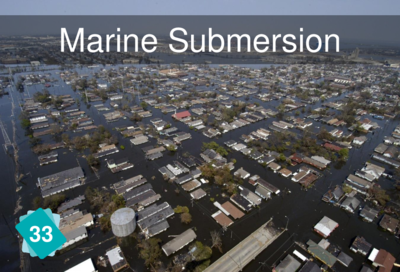En-en adult card 33 marine submersion: Difference between revisions
No edit summary |
m (Minor corrections) |
||
| Line 16: | Line 16: | ||
=== Examples of events === | === Examples of events === | ||
The Maldives and the capital Malé are already struggling to meet the challenges of | The Maldives and the capital Malé are already struggling to meet the challenges of submersion: the island is committed to achieving carbon neutrality, as are the Marshall Islands, whose properties are threatened every year because of a drought in 2013 and rising water levels that endanger food security. The "Pacific Small Island Developing States" PSIDS (Fiji, Marshall, Micronesia, Vanuatu, Papua New Guinea, etc.) are collectively positioning themselves to analyse the risks linked to climate change<ref>[https://www.un.org/esa/dsd/resources/res_pdfs/ga-64/cc-inputs/PSIDS_CCIS.pdf Pacific Small Island Developing States, ''Views on the Possible Security Implications of Climate Change to be included in the report of the Secretary-General to the 64th Session of the United Nations General Assembly'']</ref>. | ||
== References == | == References == | ||
Revision as of 17:13, 21 March 2021
Card #33: Marine Submersion
| Causes | Consequences | |

|
Cyclones and weather disturbances bring wind (therefore waves) and low pressure conditions.
1 hectopascal less means a 1 cm sea level rise.
Therefore cyclones can cause marine submersions (or coastal flooding), amplified by the sea level rise already caused by global warming.
Explanation
Not to be confused with floods. Marine submersion is seawater or ocean water rising. This rise can be exceptional because of extreme weather events, or permanent because of rising water levels.
Other possible links
Consequences
Freshwater resources If seawater rises, it can penetrate the water tables, which are freshwater reserves.
To go further
Examples of events
The Maldives and the capital Malé are already struggling to meet the challenges of submersion: the island is committed to achieving carbon neutrality, as are the Marshall Islands, whose properties are threatened every year because of a drought in 2013 and rising water levels that endanger food security. The "Pacific Small Island Developing States" PSIDS (Fiji, Marshall, Micronesia, Vanuatu, Papua New Guinea, etc.) are collectively positioning themselves to analyse the risks linked to climate change[1].